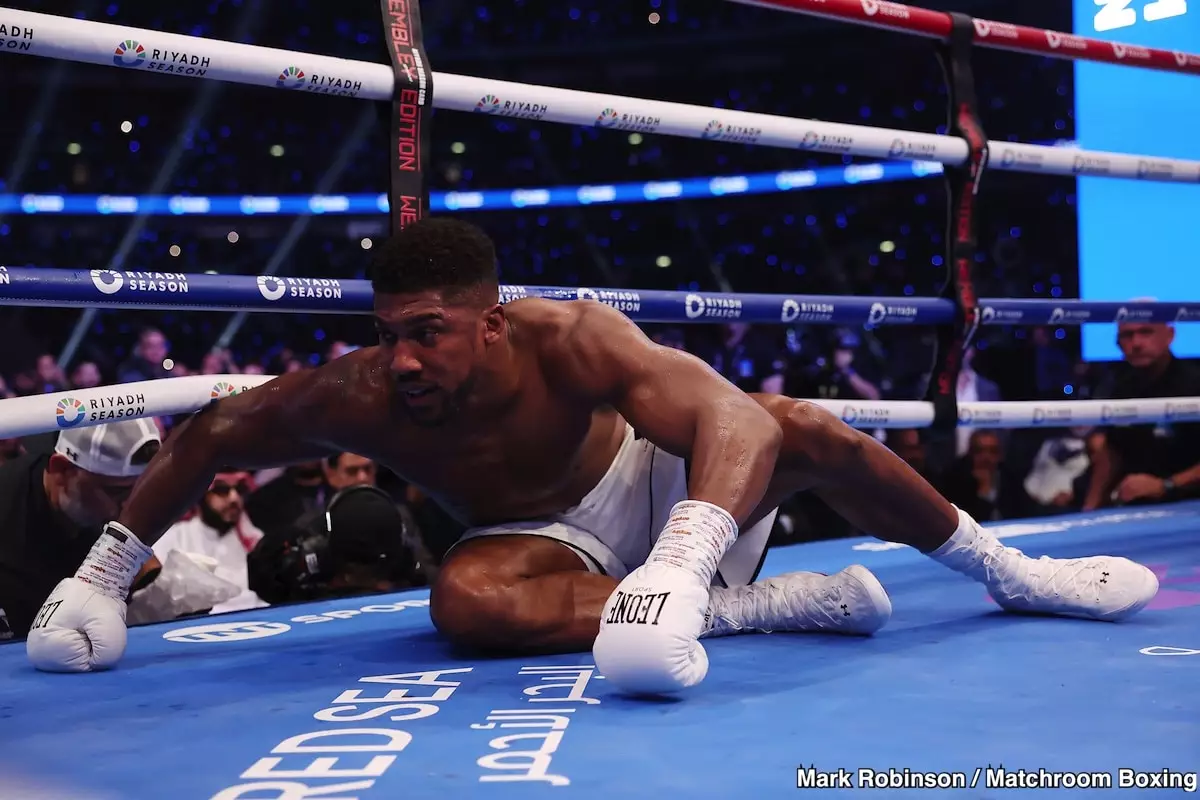In the realm of professional boxing, losses are often monumental, shaping a fighter’s career and the trajectory of their success. Anthony Joshua’s recent fifth-round knockout against Daniel Dubois has raised questions not just about his immediate future, but also about the broader implications for a fighter who has experienced both triumph and heartbreak. Terence Crawford, the reigning WBA junior middleweight champion, has openly expressed his skepticism regarding Joshua’s ability to recover from such a defeat. With a professional record now standing at 28 wins and 4 losses, Joshua’s confidence appears to have waned, raising concerns about wear and tear from his demanding 11-year career in the ring.
“It’s going to be tough,” Crawford remarked, acknowledging the challenges Joshua faces as he attempts to respond to the physical and mental toll of his latest bout. While Joshua has shown resilience in the past, this latest setback—especially one punctuated by a significantly damaging knockout—encapsulates the uncertain road ahead for him. Given Crawford’s own experience as a fighter at 36, the weight of his words carries heavy significance, especially when coupled with the reality that he too has started showing signs of aging in the ring.
Overconfidence and Tactical Missteps
A crucial aspect of the matchup that’s frequently discussed is the role that overconfidence played in Joshua’s performance. Crawford pointed out that Joshua became too aggressive after hurting Dubois, ultimately abandoning fundamental defensive techniques essential for any fighter. The fifth round showcased this lapse in judgment, as Joshua traded caution for the desire to finish the fight, leaving himself vulnerable to a counter-attack. “He [Joshua] forgot about his defense and forgot about the fundamentals,” Crawford noted, highlighting a key lesson for any combat athlete: the importance of maintaining tactical discipline, even when in a seemingly advantageous position.
This fight was riddled with ebb and flow, as Joshua had previously suffered two early drops, creating a sense of urgency that Candyman might have miscalculated. The inclination to push for a knockout against a determined Dubois—a fighter with significant power himself—risked his own stability in the ring. In boxing, such moments define careers; the rapid shift from offensive intent to defense can determine the winner in an instant. Unfortunately for Joshua, it played a pivotal role in his downfall.
Mental fortitude is as vital as physical strength in boxing, and Joshua’s defeat poses a significant psychological challenge. In combat sports, the aftermath of a loss can induce self-doubt, altering a fighter’s approach in subsequent bouts. As Crawford noted, the question remains whether Joshua can compartmentalize this experience, learning from it without hyperfocusing on the defeat. The journey to recovery will not solely involve physical training but also mental resilience—a crucial factor that could dictate the nature of his comebacks.
Moreover, it’s essential to highlight the role of Joshua’s promoter, Eddie Hearn, and how he has strategically managed Joshua’s career, especially in matching him against opponents who might mitigate risks. The fight against a younger, aggressive Dubois marked a stark contrast, suggesting that Joshua might need to rethink his trajectory and approach, especially in selecting opponents for future fights.
While doubts linger regarding Joshua’s ability to rebound from this loss, it is critical to remain optimistic about his future. Fighters have demonstrated resilience before—returning stronger, both physically and mentally—after a setback. Whether Joshua has it in him remains to be seen; however, he possesses attributes that suggest he can evolve from this experience. With the right support system and training regimen, he could refine his approach and regain not just his confidence but also the respect of boxing enthusiasts, significantly impacting how his legacy unfolds.
The world of boxing is as unpredictable as it is unforgiving. Anthony Joshua’s latest loss might be viewed as a significant turning point in his career. While doubts abound about his future, boxing fans and analysts alike should remain watchful and hopeful, as the essence of sports lies in comebacks and redemption. Just as Crawford highlighted, the fight has not only defined their careers but also opened discussions about resilience and the art of battling—integral to both sports and life.

